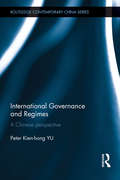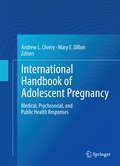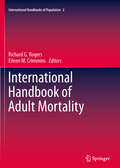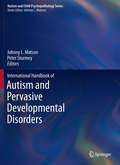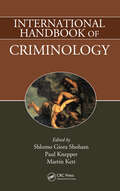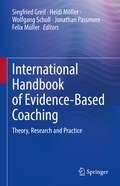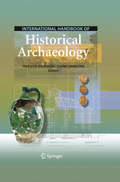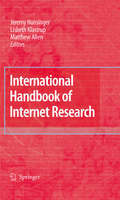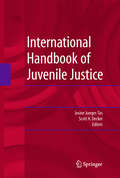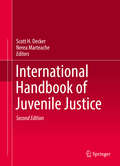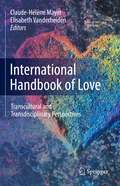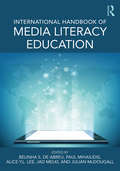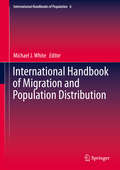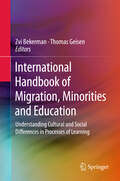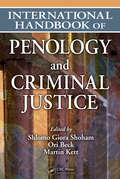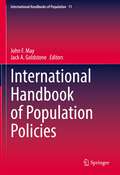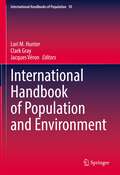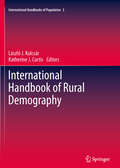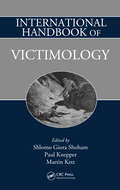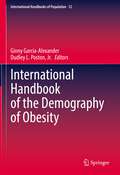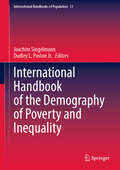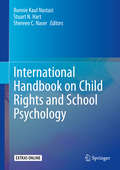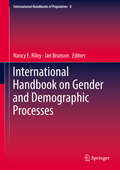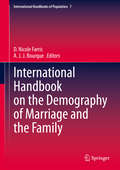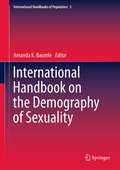- Table View
- List View
International Governance and Regimes: A Chinese Perspective (Routledge Contemporary China Series)
by Peter Kien YuThis book examines China’s involvement in international governance, international regimes, and globalization. Peter Kien-hong Yu offers a new framework with which to understand ‘international regimes’ and applies it to important Chinese case studies such as arms control, disarmament, and non-proliferation; the counter-piracy regime and the environmental issue. Whilst internationally important matters related to such systems are identified, Yu’s discussions attempt to find out whether any particular system works better in relation to China, and asks if not, why not? After examining eight different cases, the author concludes that these regimes are working but there is ample room for improvement and that the Chinese (Communists) for one have to enhance their understanding of international governance and try to export their experience to other parts of the world. International Governance and Regimes will be appeal to anyone interested in International Politics, Chinese Studies, Political theory and International Relations.
International Handbook of Adolescent Pregnancy
by Andrew L. Cherry Mary E. DillonThe rates are on the decline worldwide. But adolescent pregnancies still occur, placing millions of girls each year at risk for medical complications and social isolation and their babies for severe health problems-especially when prenatal care is inadequate or nonexistent. But as the opportunity for young women and girls increases around the world, adolescent pregnancy will continue to decline. Featuring reports from countries across the developed and developing worlds, the International Handbook of Adolescent Pregnancy analyzes the scope of the problem and the diversity of social and professional responses. Its biological/ecological perspective identifies factors influencing childhood pregnancy, as well as outcomes, challenges and needs of very young mothers as they differ across nations and regions. Salient comparisons are made as cultural contexts and community support vary widely and attention is paid to issues such as child marriage, LGBT concerns and the impact of religion and politics on health care, particularly access to contraception, abortion and other services. This global coverage heightens the understanding of readers involved in care, education and prevention programs and otherwise concerned with the psychosocial development, reproductive health and general well-being of girls. Included in the Handbook: Biological influences of adolescent pregnancy. Adolescent maternal health and childbearing. Adolescent pregnancy and mental health. International perspectives on adolescent fathers. Adolescent pregnancy as a feminist issue. Adolescent pregnancy as a social problem. Plus viewpoints from more than thirty countries. As a unique source of up-to-date findings and clear-headed analysis, the International Handbook of Adolescent Pregnancy is a go-to reference for practitioners and researchers in maternal and child health, pediatrics, adolescent medicine and global health.
International Handbook of Adult Mortality
by Eileen M. Crimmins Richard G. RogersThis handbook presents a comprehensive and up-to-date overview of unprecedented substantive, theoretical, methodological, and statistical developments and insights, and an in-depth examination of trends and patterns, in adult mortality around the world. With over two dozen chapters and more than 50 authors, this volume draws from top international mortality experts to provide one of the best overviews of life expectancy extant. The book documents remarkable gains in life expectancy, which stand out as one of the most important accomplishments of the twentieth century. Individuals in more developed countries can expect to live longer now than ever before, especially the Japanese who enjoy record-setting life expectancies. The book also explores unfortunate declines in life expectancy in selected countries brought on by such factors as infectious diseases; accidents, suicides, and homicides; and political and economic conflict and turmoil. This book synthesizes the wealth of mortality information available, clearly articulates the central findings to-date, identifies the most appropriate datasets and methods currently available, illuminates the central research questions, and develops an agenda to address these research questions. The authors carefully examine central factors related to mortality, including health behaviors, socioeconomic status, social relations, biomarkers, and genetic factors. The book will prove especially relevant to researchers, students, and policy makers within social and health sciences who want to better understand international trends and patterns in adult mortality.
International Handbook of Autism and Pervasive Developmental Disorders
by Johnny L. Matson Peter SturmeyBased on a solid historical foundation of autism theory and research, this inclusive handbook integrates coverage of the broader scholarly literature with a trenchant analysis of the state of the field in nosology, etiology, assessment, and treatment.
International Handbook of Criminology
by Paul Knepper Shlomo Giora Shoham Martin KettThe second handbook in the Shoham trilogy, which includes the esteemed International Handbook of Penology and Criminal Justice and the upcoming International Handbook of Victimology, this volume is a comprehensive treatment of criminology theory. This text contains contributions from 25 of the top international scholars in the field across a wide range of disciplines. Topics include social deviance, research methods, biological and physiological explanations, personality types, and family socialization processes. The book also explores ecological and economic factors, differential association and situational crime prevention, cultural conflicts and immigration, as well as stigmas, group delinquency and juvenile delinquency.
International Handbook of Evidence-Based Coaching: Theory, Research and Practice
by Jonathan Passmore Heidi Möller Wolfgang Scholl Felix Müller Siegfried GreifThis handbook comprehensively covers the fundamental key concepts in coaching research and evidence-based practice and shows how coaching can be applied to multiple contexts. It provides coaching scholars, researchers and practitioners with detailed review of the key concepts, research and new insights into coaching research and practice. This key reference work includes over 70 contributions from more than 110 leading researchers and practitioners in the field across countries, and deftly combines theory with case studies and applications from psychology, sociology, business administration, organizational studies, education, and communication studies. This handbook, edited by the top scholars in the field, is meant for an academic as well as a professional readership, and is an invaluable resource for coaches, clients, coaching institutes and associations, and students of coaching.
International Handbook of Historical Archaeology
by David Gaimster Teresita MajewskiIn studying the past, archaeologists have focused on the material remains of our ancestors. Prehistorians generally have only artifacts to study and rely on the diverse material record for their understanding of past societies and their behavior. Those involved in studying historically documented cultures not only have extensive material remains but also contemporary texts, images, and a range of investigative technologies to enable them to build a broader and more reflexive picture of how past societies, communities, and individuals operated and behaved. Increasingly, historical archaeology refers not to a particular period, place, or a method, but rather an approach that interrogates the tensions between artifacts and texts irrespective of context. In short, historical archaeology provides direct evidence for how humans have shaped the world we live in today. Historical archaeology is a branch of global archaeology that has grown in the last 40 years from its North American base into an increasingly global community of archaeologists each studying their area of the world in a historical context. Where historical archaeology started as part of the study of the post-Columbian societies of the United States and Canada, it has now expanded to interface with the post-medieval archaeologies of Europe and the diverse post-imperial experiences of Africa, Latin America, and Australasia. The 36 essays in the International Handbook of Historical Archaeology have been specially commissioned from the leading researchers in their fields, creating a wide-ranging digest of the increasingly global field of historical archaeology. The volume is divided into two sections, the first reviewing the key themes, issues, and approaches of historical archaeology today, and the second containing a series of case studies charting the development and current state of historical archaeological practice around the world. This key reference work captures the energy and diversity of this global discipline today.
International Handbook of Internet Research
by Lisbeth Klastrup Matthew Allen Jeremy HunsingerThis handbook, the first of its kind, is a detailed introduction to the numerous academic perspectives we can apply to the study of the internet as a political, social and communicative phenomenon. Covering both practical and theoretical angles, established researchers from around the world discuss everything: the foundations of internet research appear alongside chapters on understanding and analyzing current examples of online activities and artifacts. The material covers all continents and explores in depth subjects such as networked gaming, economics and the law. The sheer scope and breadth of topics examined in this volume, which ranges from on-line communities to e-science via digital aesthetics, are evidence that in today's world, internet research is a vibrant and mature field in which practitioners have long since stopped considering the internet as either an utopian or dystopian "new" space, but instead approach it as a medium that has become an integral part of our everyday culture and a natural mode of communication.
International Handbook of Juvenile Justice
by Josine Junger-Tas Scott H. DeckerThis comprehensive reference work presents inside information on the Juvenile Justice-systems in 19 different countries, both in old and new EU-member states and in the United States and Canada. The book is the result of research conducted by a group of outstanding researchers, who are concerned about trends in Juvenile Justice in the last two decades, which blur the border between criminal and juvenile justice.
International Handbook of Juvenile Justice
by Scott H. Decker Nerea MarteacheThis comprehensive reference work presents an in-depth analysis of juvenile justice systems across the world. The second edition of this Handbook has been updated with 13 new chapters, now covering a total of 34 countries, across North and South America, Europe, Asia, Africa, and the Middle East from an international and comparative perspective. The International Handbook of Juvenile Justice is the result of research conducted by a group of outstanding scholars working in the field of juvenile justice. It reflects a collective concern about trends in juvenile justice over the past two decades, trends that have begun to blur the difference between criminal and juvenile justice. Also new to the second edition, each chapter is formatted to increase the comparative aspect of the book, highlighting: #65533; The legal status of juveniles #65533; Age of majority #65533; The country's stance toward the UN Committee on the Rights of the Child #65533; Trends in juvenile crime over the period 2004-2014 #65533; Causes of juvenile crime #65533; Policing and juveniles #65533; Courts and juveniles #65533; Custodial rules for juveniles (detention, prison, mixing juveniles with adults) #65533; Alternative sanctions for juveniles: home confinement, restorative justice, restitution, etc. #65533; Differences in treatment of boys and girls This seminal work highlights similarities and differences between the various systems, and will be an important reference for researchers in criminology and criminal justice, particularly interested in juvenile delinquency and youth crime, as well as related disciplines like sociology, social work, and public policy.
International Handbook of Love: Transcultural and Transdisciplinary Perspectives
by Elisabeth Vanderheiden Claude-Hélène MayerTh is handbook includes state-of-the-art research on love in classical, modern and postmodern perspectives. It expands on previous literature and explores topics around love from new cultural, intercultural and transcultural approaches and across disciplines. It provides insights into various love concepts, like romantic love, agape, and eros in their cultural embeddedness, and their changes and developments in specific cultural contexts. It also includes discussions on postmodern aspects with regard to love and love relationships, such as digitalisation, globalisation and the fourth industrial revolution. Th e handbook covers a vast range of topics in relation to love: aging, health, special needs, sexual preferences, spiritual practice, subcultures, family and other relationships, and so on. Th e chapters look at love not only in terms of the universal concept and in private, intimate relationships, but apply a broad concept of love which can also, for example, be referred to in postmodern workplaces. Th is volume is of interest to a wide readership, including researchers, practitioners and students of the social sciences, humanities and behavioural sciences.In the 1970s through the 90s, I was told that globalization was homogenizing cultures into a worldwide monoculture. Th is volume, as risky and profound as the many adventures of love across our multiplying cultures are, proves otherwise. Th e authors’ revolutionary and courageous work will challenge our sensibilities and expand the boundaries of what we understand what love is. But that’s what love does: It communicates what is; offers what can be; and pleads for what must be. I know you’ll enjoy this wonderful book as much as I do!Jeffrey Ady, Associate Professor (retired), Public Administration Program, University of Hawaii at Manoa, Founding Fellow, International Academy for Intercultural ResearchThe International Handbook of Love is far more than a traditional compendium. It is a breath-taking attempt to synthesize our anthropological and sociological knowledge on love. It illuminates topics as diverse as Chinese love, one-night stands, teen romance or love of leaders and many more. Th is is a definitive reference in the field of love studies.Eva Illouz, author of Th e End of Love: A sociology of Negative relationships. Oxford University Press.
International Handbook of Media Literacy Education
by Paul Mihailidis Belinha S. De Abreu Julian McDougall Alice Y.L. Lee Jad MelkiAt the forefront in its field, this Handbook examines the theoretical, conceptual, pedagogical and methodological development of media literacy education and research around the world. Building on traditional media literacy frameworks in critical analysis, evaluation, and assessment, it incorporates new literacies emerging around connective technologies, mobile platforms, and social networks. A global perspective rather than a Western-centric point of view is explicitly highlighted, with contributors from all continents, to show the empirical research being done at the intersection of media, education, and engagement in daily life. Structured around five themes—Educational Interventions; Safeguarding/Data and Online Privacy; Engagement in Civic Life; Media, Creativity and Production; Digital Media Literacy—the volume as a whole emphasizes the competencies needed to engage in meaningful participation in digital culture.
International Handbook of Migration and Population Distribution
by Michael J. WhiteThis Handbook offers a comprehensive collection of essays that cover essential features of geographical mobility, from internal migration, to international migration, to urbanization, to the adaptation of migrants in their destinations. Part I of the collection introduces the range of theoretical perspectives offered by several social science disciplines, while also examining the crucial relationship between internal and international migration. Part II takes up methods, ranging from how migration data are best collected to contemporary techniques for analyzing such data. Part III of the handbook contains summaries of present trends across all world regions. Part IV rounds out the volume with several contributions assessing pressing issues in contemporary policy areas. The volume's editor Michael J. White has spent a career studying the pattern and process of internal and international migration, urbanization and population distribution in a wide variety of settings, from developing societies to advanced economies. In this Handbook he brings together contributors from all parts of the world, gathering in this one volume both geographical and substantive expertise of the first rank. The Handbook will be a key reference source for established scholars, as well as an invaluable high-level introduction to the most relevant topics in the field for emerging scholars.
International Handbook of Migration, Minorities and Education
by Zvi Bekerman Thomas GeisenMigrants and minorities are always at risk of being caught in essentialized cultural definitions and being denied the right to express their cultural preferences because they are perceived as threats to social cohesion. Migrants and minorities respond to these difficulties in multiple ways -- as active agents in the pedagogical, political, social, and scientific processes that position them in this or that cultural sphere. On the one hand, they reject ascribed cultural attributes while striving towards integration in a variety of social spheres, e.g. school and workplace, in order to achieve social mobility. On the other hand, they articulate demands for cultural self-determination. This discursive duality is met with suspicion by the majority culture. For societies with high levels of migration or with substantial minority cultures, questions related to the meaning of cultural heterogeneity and the social and cultural limits of learning and communication (e.g. migration education or critical multiculturalism) are very important. It is precisely here where the chances for new beginnings and new trials become of great importance for educational theorizing, which urgently needs to find answers to current questions about individual freedom, community/cultural affiliations, and social and democratic cohesion. Answers to these questions must account for both 'political' and 'learning' perspectives at the macro, mezzo, and micro contextual levels. The contributions of this edited volume enhance the knowledge in the field of migrant/minority education, with a special emphasis on the meaning of culture and social learning for educational processes.
International Handbook of Penology and Criminal Justice
by Shlomo Giora Shoham Martin Kett Ori BeckAt the outset of the twenty-first century, more than 9 million people are held in custody in over 200 countries around the world.--from the essay "Prisons and Jails" by Ron KingThe first comparative study of this increasingly integral social subject, International Handbook of Penology and Criminal Justice provides a comprehensive and balanced revie
International Handbook of Population Policies (International Handbooks of Population #11)
by Jack A. Goldstone John F. MayThis Handbook offers an array of internationally recognized experts’ essays that provide a current and comprehensive examination of all dimensions of international population policies. The book examines the theoretical foundations, the historical and empirical evidence for policy formation, the policy levers and modelling, as well as the new policy challenges. The section Theoretical Foundations reviews population issues today, population theories, the population policies’ framework as well as the linkages between population, development, health, food systems, and the environment. The next section Empirical Evidence discusses international approaches to design and implement population policies on a regional level. The section Policy Levers and Modelling reviews the tools and the policy levers that are available to design, implement, monitor, and measure the impact of population policies. Finally, the section New Policy Challenges examines the recurrent and emerging issues in population policies. This section also discusses prospects for demographic sustainability as well as future considerations for population policies. As such this Handbook provides an important and structured examination of contemporary population policies, their evolution, and their prospects.
International Handbook of Population and Environment (International Handbooks of Population #10)
by Jacques Véron Lori M. Hunter Clark GrayThis handbook presents a timely and comprehensive overview of theory, data, methods and research findings that connect human population dynamics and environmental context. It presents regional summaries of empirical findings on migration and environmental connections and summarizes environmental impacts of migration – such as urbanization and deforestation. It also offers background on the health implications of environmental conditions such as climate change, natural disasters, scarcity of natural resources, as well as on resource scarcity and fertility, gender considerations in population and environment, and the connections between population size, growth, composition and carbon emissions. This handbook helps readers to better understand the complexities within population-environment connections, in addition to some of the opportunities and challenges within environmental demography. As such this collection is an invaluable resource for students, researchers, and policy analysts in the areas of demography, migration, fertility, health and mortality, as well as environmental, global and development studies.
International Handbook of Rural Demography
by László J. Kulcsár Katherine J. CurtisThis is the third in an essential series of Springer handbooks that explore key aspects of the nexus between demography and social science. With an inclusive international perspective, and founded on the principles of social demography, this handbook shows how the rural population, which recently dropped below 50 per cent of the world total, remains a vital segment of society living in proximity to much-needed developmental and amenity resources. The rich diversity of rural areas shapes the capacity of resident communities to address far-reaching social, environmental and economic challenges. Some will survive, become sustainable and even thrive, while others will suffer rapid depopulation. This handbook demonstrates how these future development trajectories will vary according to local characteristics including, but not limited to, population composition. The growing complexity of rural society is in part a product of significant international variations in population trends, making this comparative and comprehensive study of rural demography all the more relevant. Collating the latest research on international rural demography, the handbook will be an invaluable aid to policy makers as they try to understand how demographic dynamics depend on the economic, social and environmental characteristics of rural areas. It will also aid researchers assessing the unique factors at play in the rural context and endeavoring to produce meaningful results that will advance policy and scholarship. Finally, the handbook is an ideal text for graduate students in a spread of disciplines from sociology to international development.
International Handbook of Victimology
by Paul Knepper Shlomo Giora Shoham Martin KettIn the nearly four decades since the First International Symposium on Victimology convened in Jerusalem in 1973, some concepts and themes have continued to hold a prominent place in the literature, while new ones have also emerged. Exploring enduring topics such as conceptions of victimhood, secondary and hidden victimization, and social services f
International Handbook of the Demography of Obesity (International Handbooks of Population #12)
by Dudley L. Poston Ginny Garcia-AlexanderThis handbook provides a demographic examination of global obesity trends by bringing together the range of research conducted in this field by demographers, sociologists, epidemiologists, and other quantitatively and demographically oriented social scientists. It utilizes a multidisciplinary demographic approach to provide insights into the global prevalence and mechanisms of obesity, as well as the population level impacts of rising obesity. Major sections include: global obesity trends and prevalence; obesity and demographic structures, processes, and characteristics; emerging areas of study; and obesity in LGBAT populations. This handbook provides readers with a broad understanding of population-based research on obesity and serves as a resource for scholars, students, policymakers, and researchers.
International Handbook of the Demography of Poverty and Inequality (International Handbooks of Population #13)
by Dudley L. Poston Jr. Joachim SingelmannThis handbook provides a comprehensive and comparative review of poverty and inequality in developing and developed countries from demographic, sociological, and political perspectives. It discusses, among others, the basics of poverty and inequality, issues of poverty and inequality among race/ethnic and sexual minority subpopulations, social processes, country and comparative perspectives, child poverty, and anti-poverty policies. It also touches on regional disparities. There has been rapid decline in poverty and inequality in China, East Asian and Pacific countries. Declines have also occurred in South Asia. But in Sub-Saharan Africa, poverty and inequality have risen in some countries, while in other regions, such as transition economies in Europe and Central Asia, only modest changes have occurred. This handbook provides a great reference for demographers, social scientists, policy makers and NGOs.
International Handbook on Child Rights and School Psychology
by Bonnie Kaul Nastasi Stuart N. Hart Shereen C. NaserThis handbook examines the meanings, implications, and transformative potential of a child-rights approach for school psychology. It focuses on the school community, in which psychology is committed to promoting well-being, learning, and development of all children. The handbook begins with an overview of the 1989 United Nations Committee on the Rights of the Child (CRC) and explores main themes such as, survival, protection, development, participation, and nondiscrimination. Chapters provide guidance in promoting and protecting child rights when dealing with critical issues relevant to the school community, including well-being, freedom from violence, and access to high quality education. In addition, chapters analyze and offer recommendations for child rights applications within the roles and responsibilities of school psychologists. The handbook concludes with future directions for achieving a child-rights approach for school psychology. Topics featured in this handbook include:The current status of child rights in the international community.Accountability for child rights by school psychology.Collaborative home, school, and community practices aimed at promoting family support.Protecting child rights within the realm of competitive sports.CRC and school-based intervention programming.Promoting child rights through school leadership.Applying child rights-respecting research to the study of psychological well-being. The International Handbook on Child Rights and School Psychology is a must-have resource for researchers, scientist-practitioners, clinicians, and graduate students in child and school psychology, educational policy and politics, social work, public health, and other school-based or child-serving mental health disciplines.
International Handbook on Gender and Demographic Processes (International Handbooks Of Population Ser. #8)
by Jan Brunson Nancy E. RileyThis handbook presents a comprehensive and up-to-date overview of gender in demography, addressing the many different influences of gender that arise from or influence demographic processes. It collects in one volume the key issues and perspectives in this area, whereby demography is broadly defined. The purpose in casting a wide net is to cover the range of work being done within demography, but at the same time to open up our perspectives to neighboring fields to encourage better conversations around these issues.The chapters in this handbook carefully document definition and measurement issues, and take up parts of the demographic picture and focus on how gender plays a role in outcomes. In other cases, gender often plays a cross-cutting role in social processes; rather than having a single or easily distinguishable role, it often combines with other social institutions and even other statuses and inequalities to affect outcomes. Thus, a key factor in this volume is how gender interacts with race/ethnicity, class, nationality, and sexuality in any demographic setting.While each section contains chapters that are broad overviews of the current state of knowledge and behavior, the handbook also includes chapters that focus on specific cultures or events in order to examine how gender operates in a particular circumstance.
International Handbook on the Demography of Marriage and the Family (International Handbooks of Population #7)
by Karista K. Hughes Elizabeth Harmon ThreattThis handbook provides a global perspective on contemporary demographic theories and studies of marriage and the family. Inside, readers will find a comprehensive analysis that enables demographic comparison between and across international borders. Coverage is centered around four main sections that present a history of marriage and the family, detail relevant data and measurement concerns, examine global marriage practices, analyze interactions of such demographic characteristics as age, sex, and race with marriage and the family, and consider public policy, contemporary trends, and future directions. In addition, the book includes research on current social issues such as alternative family structures, cohabitation, divorce, boomerang children, and adoption. The family is universal but extremely varied in form and function. This handbook provides students, researchers, and policymakers with an all-inclusive, international demographic analysis that fully investigates the diverse nature of the modern family.
International Handbook on the Demography of Sexuality
by Amanda K. BaumleThe International Handbook on the Demography of Sexuality is the first book to specifically address the study of sexuality from a demographic perspective. Demographic research has largely paid little attention to sexuality as a whole, or sexual orientation in particular, other than in studies examining the "consequences" of sex - sexually transmitted infections or fertility. Instead, the content of this handbook explores population sexuality in order to describe the prevalence of sexual behaviors, desires, and identities, as well as their connections with other demographic outcomes. The focus is on analyzing sexuality as a demographic topic in its own right, rather than solely as a variable in studies of sexually transmitted infection or other health-related topics. In this book, both researchers with traditional demographic backgrounds, as well as those with training in other disciplines, provide an overview of the state of current research on population sexuality. These chapters provide a foundation for the development of research in the burgeoning field of the demography of sexuality.
